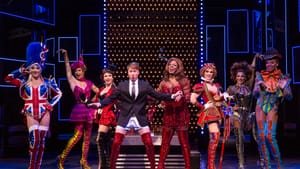Stay in the Loop
BSR publishes on a weekly schedule, with an email newsletter every Wednesday and Thursday morning. There’s no paywall, and subscribing is always free.
Gender identity issues set to music
'Kinky Boots' at the Academy of Music

This has been a busy week for discussions of gender identity — the Diane Sawyer interview with Bruce Jenner as he goes through a gender transition; a sports program replaying Renée, a documentary about Renée Richards (born Richard Raskind), a transgender woman tennis player from the 1970s; and SCOTUS discussing the legality of banning same-sex marriages.
And now in Philadelphia there is Kinky Boots, a high-energy musical, with music by Cyndi Lauper and a book by Harvey Fierstein, that tackles issues like what to call someone who is transgender, the differences between a transvestite and a drag queen, and just being accepting of others, as well as ourselves, when we don’t quite fit what society considers normal.
Kinky Boots is the story of Charlie (Steven Booth), who suddenly inherits his father’s failing shoe business. In an effort to keep the factory going, he forms an unlikely alliance with Lola (Kyle Taylor Parker), a drag queen from London, who represents an underserved shoe-buying population — drag queens who are too heavy and too large to wear women’s shoes comfortably. But bringing Lola into his conventional world does not go smoothly. A few of the workers in the factory, particularly Don (Joe Coots), are unwilling to accept Lola. Charlie’s fiancée Nicola (Grace Stockdale) thinks his plan is wrongheaded. Even Lola has trouble accepting herself, not trusting her talents as a designer, wearing pants, and calling herself Simon to try to fit in. Only Lauren (Lindsay Nicole Chambers) is there to support Charlie, providing a hint of a romantic arc, although Charlie’s relationship with Lola drives the play.
Unfortunate gold lamé
Kinky Boots is based on a charming, low-key 2005 movie of the same name that I discovered on a sleepless, late-night TV binge several years ago. I saw it again before seeing the show and noted many places that would work for songs. Fierstein and Lauper used several of those spots, including one just right for the powerful “Not My Father’s Son.” The musical adheres closely to the movie’s plot, with changes that didn’t affect the story or the emotion. The meet-cute due to a broken heel is changed around a bit, a cheating girlfriend is just someone who can’t take it anymore, a nursing home ties Lola’s story together, and an arm-wrestling match becomes a boxing match, clearly for visual impact, although a pair of unfortunate gold lamé boxing shorts make Simon look foolish rather than formidable.
In the movie, Chiwetel Ejiofor played Lola/Simon with a sweetness that Parker captures on the stage. Booth’s Charlie from Northampton, used to being told what to do and waiting for others to bail him out, seems like a nice guy who ought to win out in the end. There are no real villains here — the ambitious girlfriend and her boss don’t really pose much of a threat, and the reluctant Don is easily won over. The real romance is the relationship between Charlie and Lola, and how each of them needs to accept exactly who he/she is, while the ultimate challenge is for Charlie to acknowledge what he wants and take responsibility for getting it.
The first and second act finales were over-the-top fun, leaving the audience clapping as they left the theater. Unfortunately, the acoustics were such that it was difficult to understand the lyrics to most songs, with only a chorus here or there becoming fully intelligible. On the positive side, the music and lyrics were original, a bonus in a world that specializes in repackaging familiar tunes and tying them together with a lame book. On the other hand, none of the songs has become well-known enough for the audience to sing along, if only in their heads.
Communicating through costume
Kinky Boots plays with the superficial aspects of gender identity to make a deeper point. We are all wearing costumes in a sense. Lola and the Angels, her backup group, dress as women; Charlie wears the suit of the young businessman; and Don wears the overalls of the factory worker — yet they all, it seems, lust for bright red boots, or as Lola says, “two-and-a-half feet of tubular sex.” They all want to be passionate about something.
Clothes don’t make the man, or woman, but they are indicators of how we see ourselves. In the Jenner interview, the question of what he will wear in his female persona was discussed (we were told that he wore a slim black dress to his dinner with Diane) but not shown. In Kinky Boots, what Simon/Lola wears becomes very much a point of contention, when Charlie asks him to look like his passport.
Kinky Boots may make light of what we call each other or what we wear, but it makes the point loud and clear that we need to accept one another for who we are, whether we are “ladies, gentlemen, or those who have yet to make up their minds.”
What, When, Where
Kinky Boots. Book by Harvey Fierstein, music and lyrics by Cyndi Lauper. Based on the 2005 movie Kinky Boots, written by Geoff Deane and Tim Firth. Jerry Mitchell directed and choreographed. Through May 10, 2015 at Academy of Music, Broad and Locust Sts., Philadelphia. 215-893-1999 or www.kimmelcenter.org.
Sign up for our newsletter
All of the week's new articles, all in one place. Sign up for the free weekly BSR newsletters, and don't miss a conversation.

 Naomi Orwin
Naomi Orwin